IL GAS NATURALE LIQUEFATTO (ANCORA) AMA IL GREENWASHING
15.10.2025
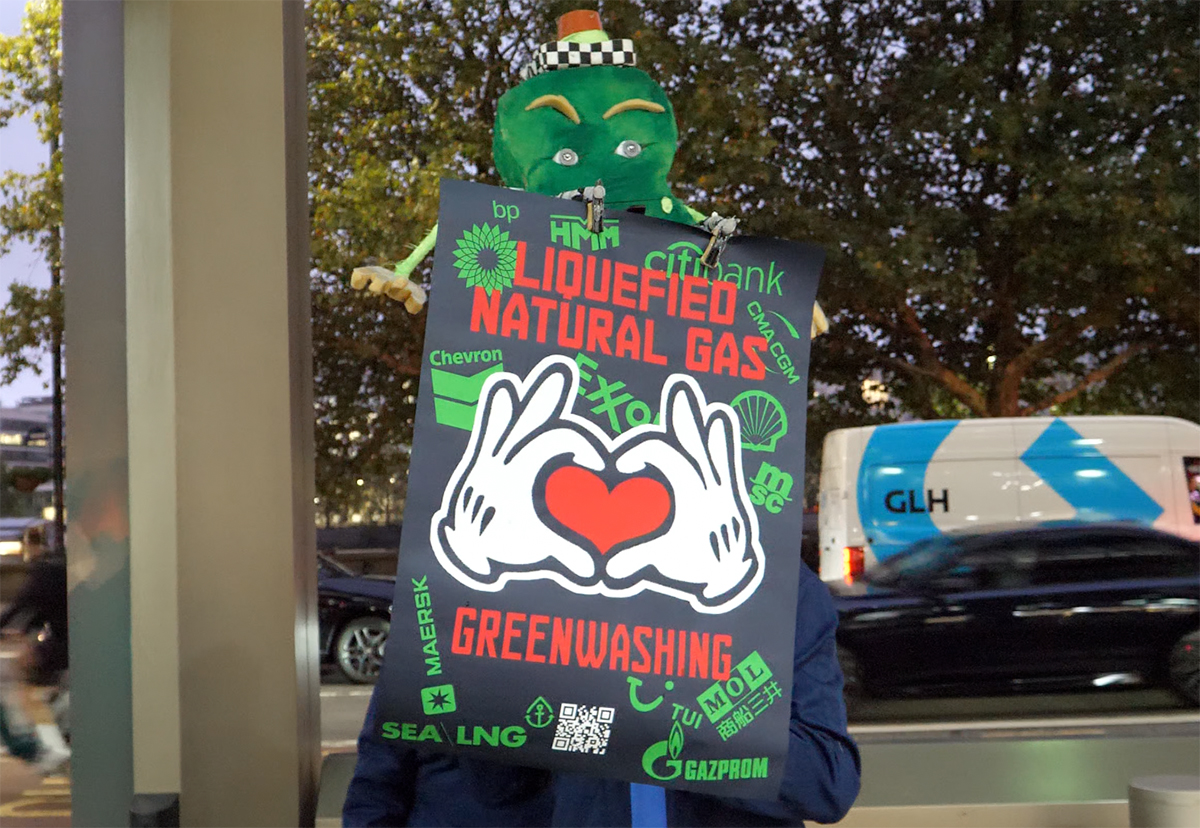
⬆️ Scrubby si prepara ad incollare manifesti alle finestre dell'IMO delle Nazioni Unite.
-
Questa settimana si riunisce la seconda sessione straordinaria dell'Organizzazione marittima internazionale (IMO) delle Nazioni Unite. In questa riunione i delegati dell'IMO e gli Stati membri metteranno a punto i piani per la regolamentazione dell'inquinamento marittimo.
Per celebrare questa occasione speciale, abbiamo pensato di ricordare loro che non tutte le emissioni di spedizione sono trattate allo stesso modo. Anzi, alcune potrebbero non essere considerate affatto. La scorsa settimana Shell ha annunciato l'intenzione di estrarre più gas naturale liquefatto - il carburante per il quale l'industria del petrolio, del gas e del trasporto marittimo sta facendo pressioni per essere esentata dalle norme sull'inquinamento marittimo dell'IMO.
⬆️ La riqualificazione delle finestre è iniziata!
-

⬆️ Perché ci sono dei manifesti sulla finestra? Per ricordare agli Stati membri e ai delegati dell'IMO dell'ONU che tutti i combustibili fossili devono essere trattati allo stesso modo. Dopo tutto, il "gas naturale liquefatto ❤️ Greenwashing" è solo quando il GNL sfugge alle norme sull'inquinamento marittimo previste.
-

⬆️ Ecco che arriva Scrubby con un altro poster.
-
Il destino dell'Oceano dipende da tutti noi.
I nostri interventi dipendono dal vostro sostegno.
Alle ore 18:00, mentre i delegati stavano gustando tartine e sorseggiando vino, una "Spugna per il greenwashing" è apparsa alla finestra della loro reception con in mano un poster. Un manifesto contenente il messaggio grafico "Il gas naturale liquefatto ama il greenwashing". Il precario Scrubby, che opera su un lungo palo di 4 metri, ha incollato il manifesto sulla finestra, dando a tutti i presenti l'opportunità di applaudire le sue meravigliose capacità. Poi è sceso a terra per raccogliere un altro poster e ripetere il processo fino a oscurare le finestre dell'IMO.
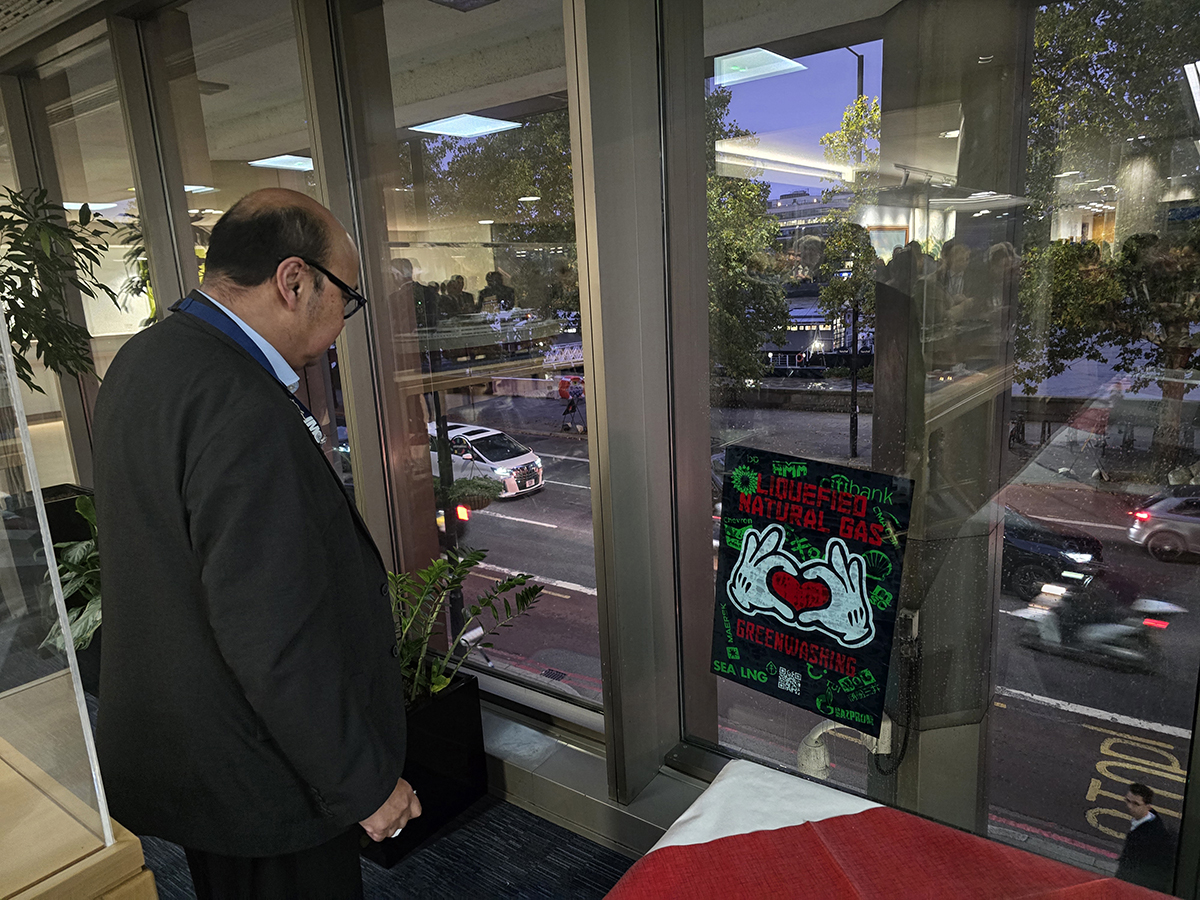
⬆️ È ora di dare un'occhiata più da vicino a chi ha fatto il greenwashing del GNL. Non c'è bisogno di guardare lontano, i membri di MARE/GNL fornisce un elenco completo di furfanti. Il petrolio e il gas non possono far parte del "futuro della navigazione". Se l'IMO delle Nazioni Unite vuole seriamente ridurre l'inquinamento, il trasporto marittimo deve smettere di utilizzare i combustibili fossili.
-
Scrubby rappresenta il palese greenwashing che darà al GNL un lasciapassare per evitare qualsiasi piano del MEPC per includere il GNL nei regolamenti sull'inquinamento del trasporto marittimo e nei prelievi fiscali - rendendo il GNL il combustibile fossile di elezione per il trasporto marittimo (accelerando comunque le emissioni pericolose e i profitti osceni per le industrie dei combustibili fossili e del trasporto marittimo). Scrubby, la spugna del lavaggio verde, ha voluto assicurarsi che Il futuro del trasporto marittimo messaggio a nome di SEALNG.ORG è stato visto da tutti i delegati e gli Stati membri dell'IMO.
Dopotutto Scrubby non voleva che i suoi datori di lavoro, le industrie dei combustibili fossili e del trasporto marittimo, perdessero l'occasione di fare greenwashing sul GNL prima delle discussioni del MEPC sui prelievi sui combustibili per il trasporto marittimo (che compagnie come CMA CGM e Exxon Mobil e società di classificazione come DNV e ABS speranza che l'LNG possa evitarlo vendendosi come combustibile "verde" che certamente non è).
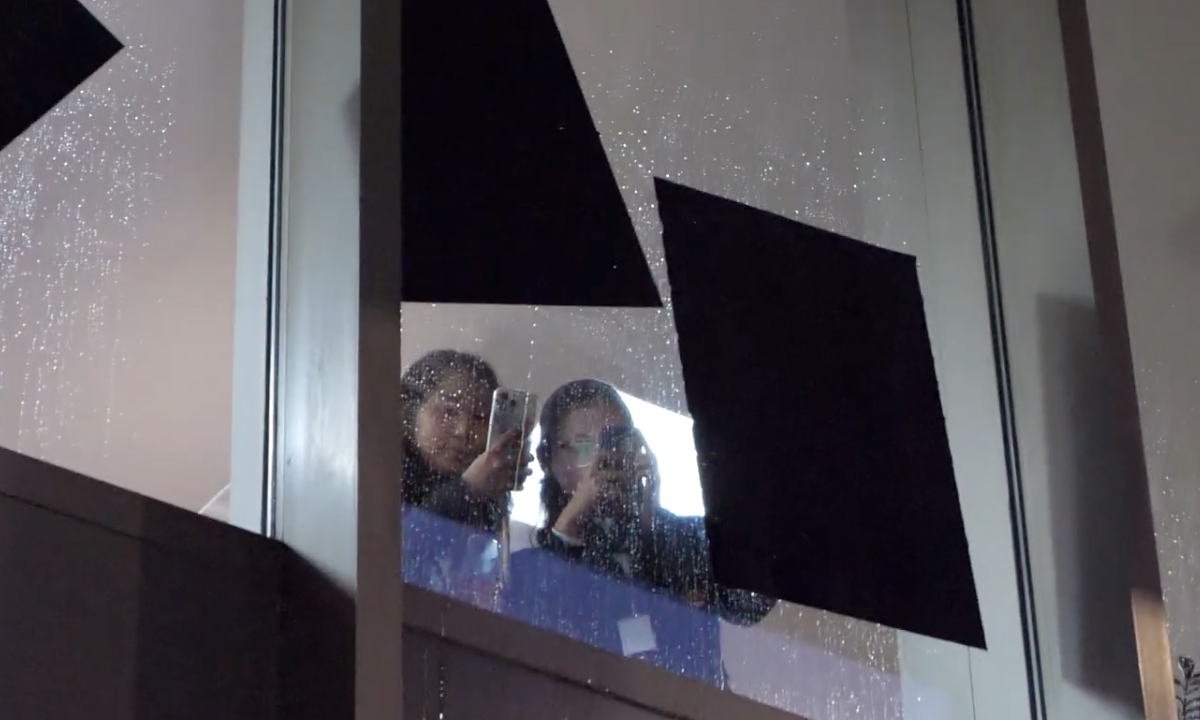
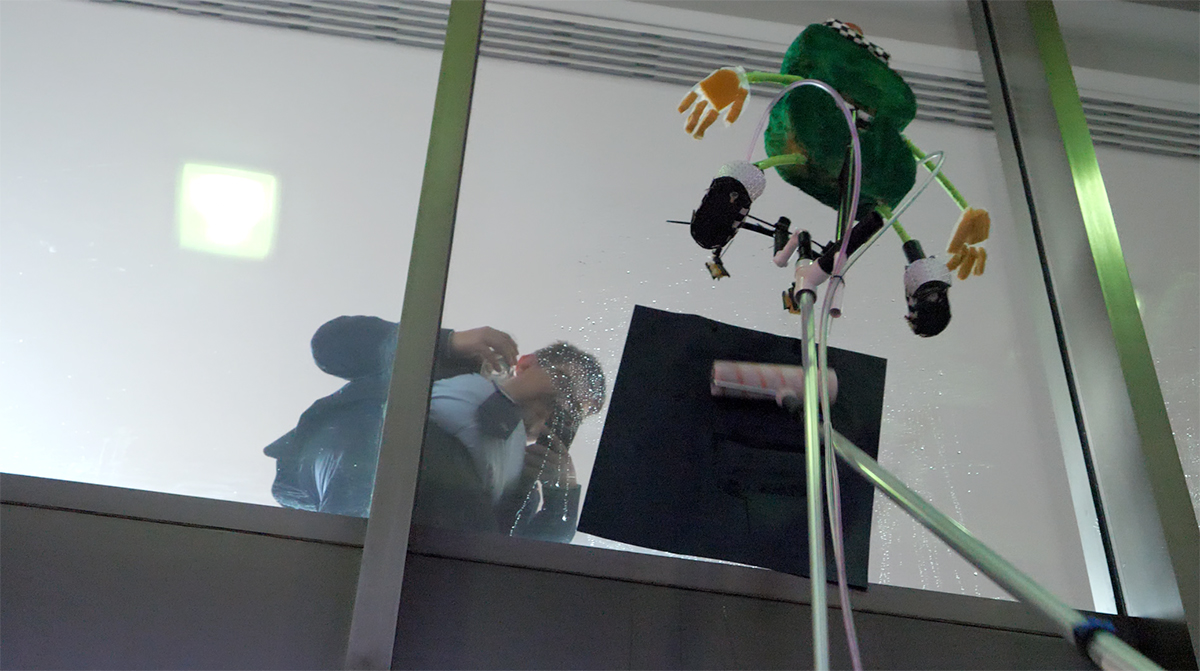
⬆️ I delegati fotografano i poster.
-
Lo spettacolo celebra il dilagante burattinismo delle riunioni del MEPC. Riunioni dominate dagli interessi dell'industria navale, un'industria intenzionata a cementare il suo rapporto con l'industria del petrolio e del gas adottando lo sporco GNL come combustibile di scelta. Questo nonostante recenti ricerche abbiano messo a nudo le bugie di piattaforme di lobbying industriale come MARE/GNL. La ricerca con revisione paritaria rivela che il GNL estratto ed esportato dagli Stati Uniti è 33% più inquinante del carbone, in lizza per il titolo di combustibile fossile più letale. Le perdite di metano si verificano durante tutto il processo di estrazione e fornitura del GNL, aumentando i livelli di mortalità e causando problemi di salute. L'estrazione del GNL distrugge la terra e le comunità costiere. ovunque appaia un impianto di GNL. Queste stesse perdite continuano a bordo Navi alimentate a GNLcontribuendo ad accelerare il collasso climatico e il collasso delle nostre economie. Per nascondere questa scomoda verità, l'industria si vanta di biometano e e-metano che rappresentano solo il 6% del mercato UE e ancora meno a livello mondiale (ed entrambi continuano a rilasciare metano lungo le loro catene di approvvigionamento e, nel caso del biometano, a consumare risorse terrestri e ad aumentare la scarsità di cibo e i prezzi). La scala industriale del greenwashing del GNL ha trasformato il MEPC dell'IMO delle Nazioni Unite in un burattino dell'industria del petrolio e del gas.

⬆️ "Questo è un terreno privato, per favore andatevene subito!!!".
"Ci proverò, signore, ma la prego di fare attenzione al pavimento bagnato, è piuttosto scivoloso".
"Se ne vada, se ne vada da questa terra, sta commettendo una violazione morbida".
"Lo farò se togliete la barriera, la mia anca non sta bene e non riesco a superarla...".
-
Gas naturale liquefatto (LNG) - i fatti
Il GNL è un combustibile fossile che, quando viene estratto, trasportato e bruciato come combustibile marino, rilascia nell'atmosfera il metano, un pericoloso gas che provoca il riscaldamento globale e che è più che sufficiente a ridurre il consumo di carburante. 80 volte in più di riscaldamento climatico a breve termine (20 anni) rispetto al biossido di carbonio.
Il Gruppo intergovernativo di esperti sul cambiamento climatico (IPCC) delle Nazioni Unite identificato una rapida riduzione delle emissioni di metano come una delle principali priorità per limitare il riscaldamento globale a un valore il più possibile vicino a 1,5°C. Il rapporto dell'IPCC ultimo rapporto concentrandosi sulla mitigazione del clima chiarisce che il gas fossile sotto forma di GNL non è una soluzione per la decarbonizzazione del trasporto marittimo.
Contrariamente a quanto richiesto dalla scienza del clima, le compagnie di navigazione e portuali sono andate a tutta birra, investire pesantemente nel GNL fossile, sostenendo che il carburante ridurrà il loro impatto ambientale e l'inquinamento climatico. Attualmente sono in ordine oltre 785 nuove navi da carico a livello globale, di cui oltre 400 costruite per funzionare con GNL fossile sporco.
Bruciare più GNL fossile a bordo delle navi è un disastro in divenire per il nostro pianeta. Non farebbe altro che aumentare le emissioni di metano dalle navi, che sono già aumentate di 180% tra il 2016 e il 2023, secondo un recente Rapporto del Consiglio internazionale per il trasporto pulito (ICCT).
Le emissioni di metano riducono anche la qualità dell'aria. Inoltre, l'aumento della domanda di GNL, anche nel settore marino, comporta impatti negativi sulla terraferma, come l'inquinamento dell'acqua potabile, la riduzione della produzione agricola e l'aumento dei tassi di mortalità prematura.

⬆️ Regolare l'inquinamento marittimo è un lavoro da fame, purtroppo le tartine non sono arrivate all'esterno.
-
Servono norme forti sul metano all'IMO
Secondo il IPCC (AR6)Per affrontare l'emergenza climatica e i suoi impatti devastanti sulle persone è necessario affrontare con urgenza le emissioni di metano nel breve periodo. I sostenitori del GNL stanno ingannando i politici sulle reali dimensioni dell'impatto climatico e sanitario del GNL, mettendo a rischio un futuro di sopravvivenza su questo pianeta.
L'Organizzazione Marittima Internazionale (IMO) è l'organismo delle Nazioni Unite che regolamenta la navigazione internazionale. Attualmente non esistono normative internazionali specifiche per le emissioni di metano delle navi. Tuttavia, esistono diverse opportunità per integrare completamente il metano nel quadro normativo dell'IMO durante il Comitato per la protezione dell'ambiente marino (MEPC82). Se ciò non dovesse accadere, proponiamo un futuro più drastico per l'IMO.
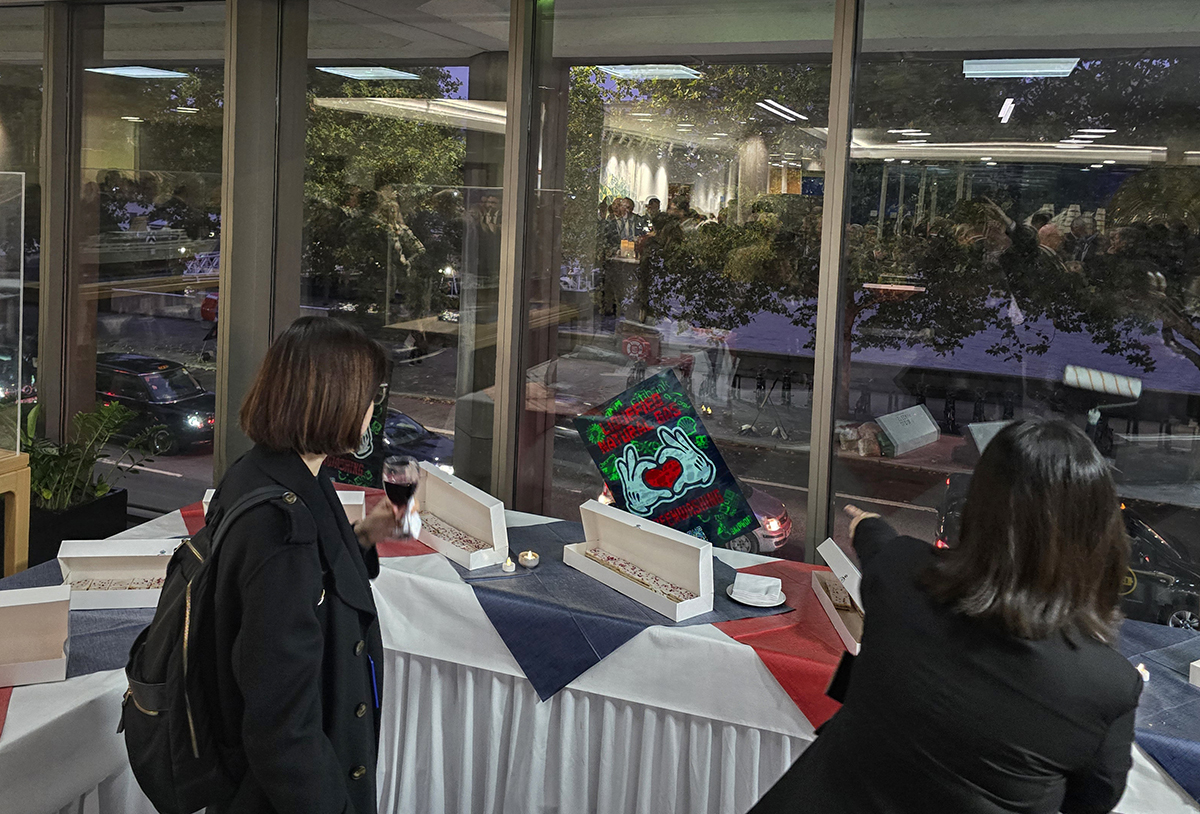
⬆️ "Guardate quel poster che il pupazzo ha attaccato alla finestra!".
"Significa che siamo complici del greenwashing?".
Sì, lo è, e lo è anche l'IMO delle Nazioni Unite se non regolamenta il metano (il sottoprodotto del GNL che perde) insieme agli altri combustibili fossili.
-
Invito all'azione presso l'IMO:
Il GNL è un combustibile fossile che ha un impatto negativo sulle persone, sull'ambiente e sul clima in ogni fase del suo ciclo di vita.
Noi chiediamo:
1. Le emissioni di metano sono considerate un gas a effetto serra e sono incluse in qualsiasi piano del MEPC per l'imposizione di una carbon tax sul trasporto marittimo, ponderata in base alla capacità di forzatura climatica in eccesso del metano fuggitivo.
2. Gli Stati membri dell'IMO riconoscono il GNL come un combustibile fossile e smettono di farsi ingannare dal SEA LNG lobbisti, chiudendoli invece fuori dall'IMO.
3. L'IMO per promuovere l'efficienza e l'uso del vapore lento, la riduzione della capacità e l'aumento della capacità di navigazione. imbarcazioni a vela e a propulsione elettrica incentivando l'adozione nel settore del trasporto marittimo, responsabilizzando e qualificando i lavoratori e introducendo rotte di trasporto più eque.
Se l'IMO non agisce la ribellione oceanica lo richiede:
L'ONU deve formare un nuovo organismo trasparente e rappresentativo per governare l'Oceano a beneficio di TUTTA la vita. Questo nuovo organismo deve avere come unico parametro di successo il ripristino e la ricostituzione dell'Oceano, da cui dipendono tutte le nostre vite. Dovrebbe sostituire il potere delle aziende con il potere delle persone. E dovrebbe rappresentare le molte forme di vita marina che fanno dell'oceano la loro casa.
-
Foto di S. Staines.